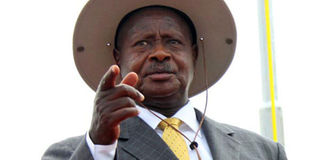Museveni cautions youth on reckless sex

President Yoweri Museveni
What you need to know:
In Uganda, new HIV infections have reduced from 140,000 in 2011 to 52,000 in 2016, according to UNAIDS. The number of persons on antiretroviral treatment has increased from 329,000 in 2011 to more than 900,000 to date, nearly three-fold increase in about 5 years. And more than two thirds of these are women.
KOLE: President Yoweri Museveni has decried the high rate of HIV prevalence among the youth in the country, warning the youngsters against indulging in reckless sex.
The President cautioned the youth and married couples to be serious with their lives and avoid lifestyle which exposes them to the risk of getting the infection.
Mr Museveni made the remarks in a speech read for him by the Vice President Edward Ssekandi, at the World Aids Day celebrations held at Abilonino National Polytechnic Instructors College in Kole District on Friday.
The theme of this year’s celebrations was “reaching men, girls and young women to reduce new HIV infections.”
“HIV is preventable and can be avoided but some people still take it for granted, thinking that it is a joke and continue indulging in unprotected sex and end up getting infected,” the President said, noting that majority of Ugandans don’t mind of knowing their health status and they continue “infecting” others.
This kind of mentality, the President said is hindering government’s efforts and vision of ending HIV by 2030.
Mr Museveni further advised the youth to abstain from sex and called on the married couples to be faithful to their partners.
He pointed out that HIV is not only spread by unprotected sex, but can also be spread through open wounds and sores in the mouths through kissing.
“This is why I decided to ban the sharing of communion cups in churches because those who are HIV positive with sore mouths can infect others who share the same cup with them during the time of communion,” he explained.
The minister of Health Jane Aceng, however, downplayed the President’s fear saying that there is remarkable reduction in new infection of HIV.
Dr Aceng said her ministry has been actively rolling out new consolidated guidelines for HIV prevention and treatment.
“In 2017, the number of HIV infected adults and children enrolled on treatment have increased to 1,028,909 down from 350,000 we had in 2013/14. Out of these, nearly one million adults and nearly 64,600 are children were registered by mid-2017 in 1,824 service delivery points across the country,” Dr Aceng explained.
The United States Ambassador to Uganda, Ms Deborah Malac, promised that her country will continue funding HIV activities in Uganda.
The crowd was move almost in to tears as people living with HIV narrated how they contracted the disease because of their lifestyles
Statistics
In Uganda, new HIV infections have reduced from 140,000 in 2011 to 52,000 in 2016, according to UNAIDS. The number of persons on antiretroviral treatment has increased from 329,000 in 2011 to more than 900,000 to date, nearly three-fold increase in about 5 years. And more than two thirds of these are women.
“As a result, the country has registered a reduction in the number of persons dying from Aids by more than half. The number of babies acquiring HIV has reduced from 28,000 in 2011 to 4,600 by the end of 2016. This represents nearly 90% reduction.
[email protected]




